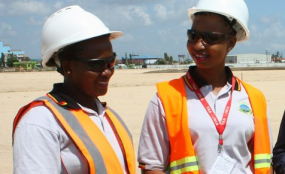Some Analyst have maintained that Africa’s future growth would largely be driven by investment in technology, how prepared are young entrepreneurs in Rwanda to be part of this growth?
Our continent is absolutely poised to grow through technology developed by young entrepreneurs. To truly spur innovation and economic growth, we must look at how we support our entrepreneurs. Great ideas and hard work are vital to entrepreneurial success, but young leaders also know that improving access to incubators and mentors will help those young innovators become successful business owners.
With half of the continent’s population under 25 years, Africa no doubt holds the world’s largest reservoir of young people. However, very few of these young people are involved in shaping the discourse on the future of the continent, what in your view should be done to correct this imbalance?
It is vital that all leaders embrace and support our young people to and show them how they can impact the future. Just as entrepreneurs need mentors to help them develop an idea into a business, our leaders must engage with young people like myself on issues if we want an engaged, active generation of leaders. In the same way, young people are just as obligated to seek those opportunities for engagement as our leaders are to engage them.
Our findings have shown that you are an advocate for Education and Healthcare as a right and not a privilege – these are two critical components for growth and development in any society; how would you say you have fared in championing this cause in Rwanda?
I see these issues as rights, and they are. These issues are so vital because the impact of both can completely transform a nation. In Rwanda, the commitment to universal healthcare has resulted in life expectancy increasing by more than one third since 2000. In terms of education, Rwanda has the highest primary school enrolment rate in Africa. As a result, our economy has steadily grown and our income per capita has doubled since 2000. This does not mean we stop advocating for better healthcare and education, but it means our efforts have shown real results.
According to International Renewable Energy Agency, IRENA, Africa is well positioned to use her renewable energy resources to fuel her future growth, adding that it is more economically competitive and capable of opening up economies of scale; how would you say the government of Rwanda is faring in employing renewable energy into the energy mix and what can other countries learn from this experience?
Renewable energy – solar in particular – presents a tremendous opportunity for Rwanda and Africa to power a sustainable future. We absolutely support renewable energy as a solution but it is not a crusade against other sources of energy. It’s more a call for the balance.
Access to funding have remained one of the major issues, confronting start-ups and entrepreneurs in the continent with bold and innovative ideas, how have you been able to sidestep some of these challenges?
As an investor myself, I focus on identifying promising start-ups in the developing world. Just as in the West, innovations and entrepreneurs in the developing world provide vital services, jobs and opportunities for both the region and the investor. We need the global investment community to understand the magnitude of investment potential in Africa. Our start-ups are just as promising as many in Silicon Valley and oftentimes can be more compelling investments for smaller firms to support.
Rwanda has become a model for progress in the continent, as the Economist recently called it the “developing world’s shining star”; what are some of the major factors to be considered by other countries hoping to learn from Rwanda’s success stories?
The first and most important factor is strong, stable leadership that seeks to improve the lives of all its citizens. Rwanda has been fortunate to have leadership that focuses upon access to healthcare, improving education, investing in renewable energy and encouraging innovation. Each of those priorities alone can improve the lives of the average Rwandan, but combined have resulted in growth and opportunity beyond expectations.
You are largely seen as a Youth Influencer in Rwanda and beyond; how are you using your position towards advocating and equipping the next generation of African Leaders?
I believe in education and healthcare as rights, and by continuing to advocate for those core issues, we can become a healthier, smarter, more productive world. However, I owe much of my success from what I have personally learned from the educational and business leaders I have encountered in my career. Due to that experience, I try to encourage young people striving for success. I work to engage young minds to challenge, support and propel them forward. The success of our next generation of leaders can only be attained if leaders like me reach out to them constructively.



